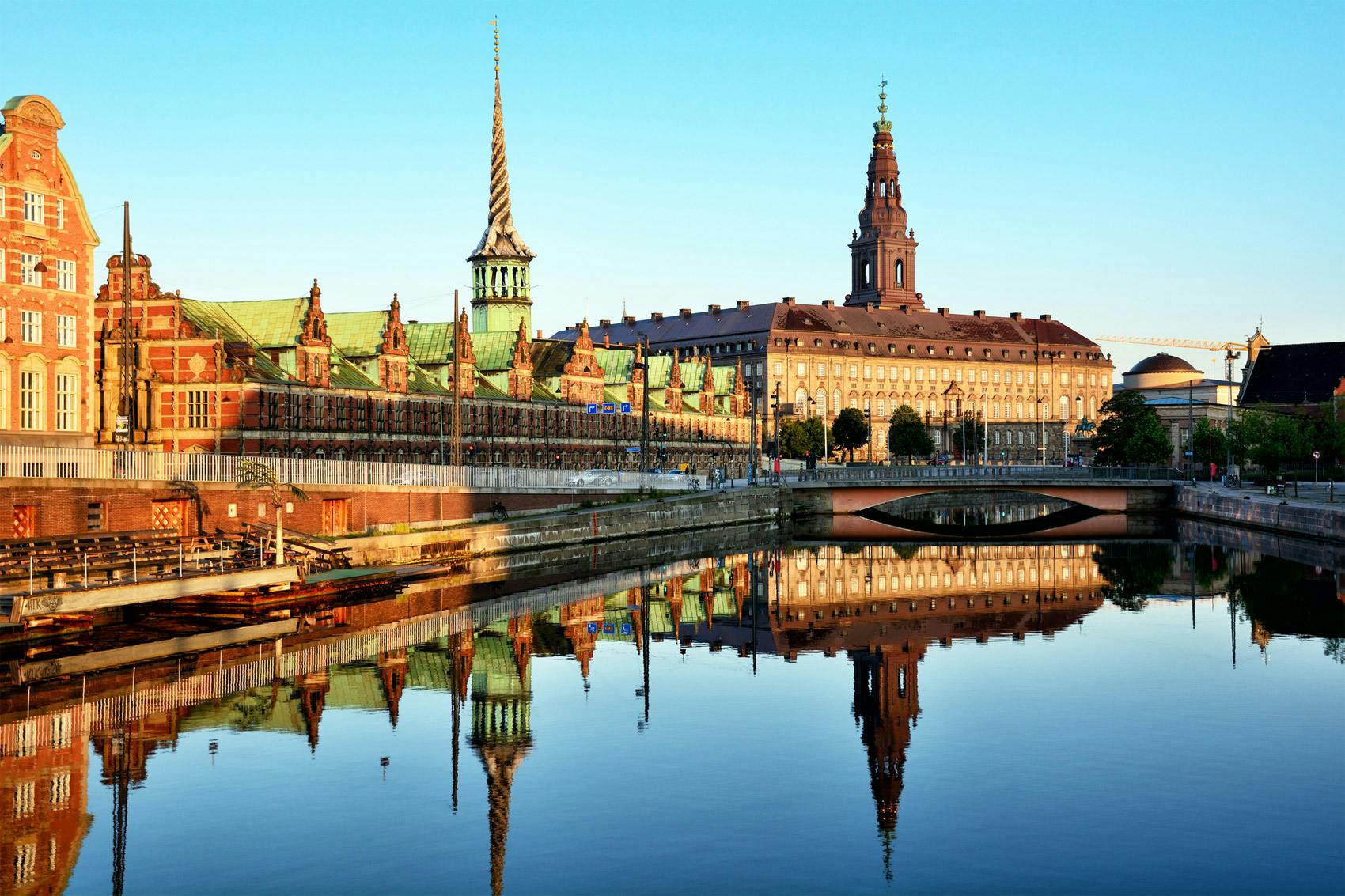Work in Denmark
Denmark beckons with its promise of flat working hierarchies, generous salaries and holiday allowance, and a lifestyle that champions work-life balance like no other
Although Denmark is known for high taxes and living costs, it offers quality public services, including free healthcare. Commuting is also pleasant, as half of Copenhagen's population cycles to work daily.
The country's laid-back and informal work culture is one of the reasons it ranks second in the World Happiness Report 2024. With nearly 49,000 expats, it's also an ideal place to experience 'hygge,' the Danish concept of cosiness and community.
While English is widely spoken in business, don't miss an opportunity to learn Danish. Many language courses are available, and knowing the local language can help you make friends and adjust to the culture.
You'll have ample time to explore Denmark's tourist attractions, such as Tivoli Gardens, the original LEGOLAND, the world's oldest fairground, and many others, thanks to generous holiday entitlements.
Jobs in Denmark
The Danish labour market is mainly composed of the services sector, followed by the industry sector, and the unemployment rate is impressively low at only 2.5%. Denmark's strategic location makes it an essential transportation hub for Europe. The country's primary exports include pharmaceuticals and medical equipment, iron and steel, food products, textiles and clothing, and electronics.
Denmark is known for its 'flexicurity' system, which allows employers to hire and fire on-demand, based on market needs. However, employees are secured by the A-kasse (unemployment insurance fund).
Workers also enjoy excellent working conditions, thanks to a solid collaboration between the unions, employers, and the government. Additionally, small and medium-sized enterprises (SMEs) dominate the market, so you will feel valued in your role, regardless of where you work in the southernmost Nordic country.
World-famous brands such as Pandora, Carlsberg, Ecco, and LEGO all have their origins in Denmark.
Popular graduate jobs
- IT consultant
- Mechanical engineer
- Primary and secondary school teachers
- Psychologist
- Radiographer
You can search for jobs in Denmark at:
Skills shortages
The Danish government maintains a 'Positive List' of occupations that are currently in shortage. If you possess the necessary qualifications to fill any of the roles on this list, you should find it easier to secure a job in Denmark.
Currently, the Danish workforce is experiencing a shortage of skilled workers in fields like:
- finance
- IT
- law
- medicine and healthcare
- management
- science and engineering
- teaching
Professions added to the list for people with a higher education degree in 2024 include:
- military officers
- heads of logistics management
- heads of products management
- biologists
- mechanical engineers
- environmental engineers
- business intelligence managers
- specialist consultants
- marketing professionals
- information technology programmers
- system developers
- web developers
- system administrators
- legal counsel
- communication consultants
For the full list see New to Denmark - The Positives Lists.

How to get a job in Denmark
As an international worker in Denmark, it can be difficult to secure employment as local applicants are often prioritised. However, there are several steps you can take to improve your chances of success.
Firstly, it's important to research the company you're applying to and tailor your CV and cover letter to suit the organisation. Demonstrating a keen interest in the specific company and relevant work experience will help you to stand out.
It may also be beneficial to explore areas that you hadn't previously considered or be willing to commute. Applying to sectors that are experiencing skills shortages can also increase your chances of securing work.
It's important to note that social media tools, particularly LinkedIn, are widely used in Denmark. Building connections and showcasing your relevant skills and experience on these platforms can increase your chances of finding employment. A polished online presence can make a significant difference in your job search.
Summer jobs
If you're interested in finding work in Copenhagen or other cities, you could consider applying directly to hotels and clubs for seasonal work. Keep in mind that there is no official application process for these types of roles.
Another option is to work as an au pair during the summer months. In exchange for providing childcare and completing household tasks, you'll receive a weekly allowance, medical insurance coverage, and rent-free accommodation. To learn more about applying for an au pair residence permit, visit New to Denmark - Au pair.
If you're able to financially support yourself, you could also participate in voluntary work opportunities. Concordia is a programme that provides volunteering placements for British citizens in a variety of areas, including festivals, environmental work, renovation projects, and working with elderly and disabled members of the community.
You can also find voluntary and paid placements through:
- AIESEC UK - for students and recent graduates.
- IAESTE UK - for science, engineering and applied arts students.
- Volunteering.dk - one of the largest portals for volunteer jobs in Denmark.
Teaching jobs
The public education system in Denmark is highly regulated. If you want to become a teacher, you must first ensure that your qualifications are recognised and approved by the Ministry of Higher Education and Science. In some cases, you may need to undergo additional training to be eligible to teach in a Danish school.
Danes usually learn English from a young age, which means there aren't many opportunities to teach English as a foreign language (TEFL). However, you might be able to find a position teaching business English at adult learning colleges or private language schools. Popular locations for TEFL jobs in Denmark include:
- Aalborg
- Aarhus
- Copenhagen
- Fredericia
- Odense.
Usually, you will need a degree and a TEFL qualification to secure a job, and some positions may also require you to speak Danish.
Internships
The majority of Danish internships are based in Copenhagen, home to many large companies. You can search for paid internships in Denmark at:
If you are a non-EU citizen who requires a visa to enter Denmark, it is possible to obtain a residence and work permit in order to take up an internship of up to 18 months, subject to certain conditions and depending on the job sector you are interested in. Learn more at New to Denmark - Internship.
Danish visas
If you are a citizen of the UK, European Economic Area (EEA), Switzerland or any other non-EU country and are planning to live and work in Denmark, you will need to apply for the appropriate residency permit through New to Denmark - You want to apply. As part of your application, you will need to provide a written contract of employment or evidence of your job offer, which should include details such as your salary and employment conditions.
If you are an EU, EEA, or Swiss citizen, you do not need a residence or work permit to enter Denmark and look for work. However, if you plan to stay in Denmark for more than three months, you must apply for a registration certificate upon arrival.
This certificate will allow you to receive a civil registration number (CPR), health insurance card, and tax number, which are all required to access public services and receive payment. If you are from one of the Nordic countries, including Norway, Finland, Iceland, or Sweden, you can live and work in Denmark without this certificate, but you must still register for a CPR, health insurance card, and tax number.

Language requirements
Danish is the official language of Denmark, but it's not the only language you'll hear. The majority of Danes speak English as a second language, and many also have a basic understanding of German, French, and Swedish.
When applying for jobs, it's best to do so in either Danish or English, but it's always a good idea to double-check with the hiring organisation for any specific language requirements.
Although you can enter the workforce without fluent Danish, learning the language is essential for integrating with the locals, immersing yourself in Danish culture, and getting the most out of your work experience in Denmark. By doing so, you'll also be showing your dedication to your employer.
There are plenty of ways to learn Danish - you could learn the language online, via classes in your home country or once you've arrived in the country.
How to explain your qualifications to employers
The Bologna Process, a framework for comparable qualifications across Europe, means that your UK qualifications should meet Danish standards. If you face any issues with the recognition of your qualifications, you can have them assessed by the Danish Agency for Higher Education to make them easier for employers to understand.
Some professions are regulated, so you may need authorisation from a public authority to confirm your qualifications.
What it's like to work in Denmark
In Denmark, the standard working week is 37 hours, from Monday to Friday. Most employers offer flexible working arrangements to cater to employees' needs. Employees are entitled to five weeks of annual leave, and the country observes 11 public holidays, including:
- New Year's Day
- Maundy Thursday
- Good Friday
- Easter Sunday
- Easter Monday
- Prayer Day
- Ascension Day
- Whit Sunday
- Whit Monday
- Christmas Day
- Second day of Christmas (26 December).
Workplaces in Denmark typically have a flat hierarchy, meaning that all employees are encouraged to contribute ideas and participate in decision-making. It is normal to discuss any issues with your CEO.
Denmark does not have a statutory minimum wage, and salaries are determined through negotiations between individuals and their employers. The country's tax system is progressive, with higher salaries incurring higher rates of tax. This system funds free public services such as healthcare and education.
Living costs, including accommodation, food, and public transport, are generally high in Denmark, reflecting the country's higher salaries and tax rates. If you are planning to move to Denmark, consider this factor when conducting research and budgeting.
For more information about the cost of living in Denmark, see livingcost.org.
Find out more
- Discover what it's like to study in Denmark.
- Learn more about Life in Denmark.

